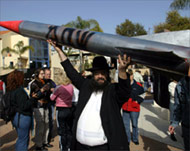TV show attempts conflict resolution
In a groundbreaking cooperative venture, Israeli and Arab TV stations on Saturday simultaneously broadcast the first part of a documentary exploring possible solutions to the Palestinian-Israeli conflict.

The programme’s maker, Search for Common Ground, a conflict-resolution foundation, hopes that by presenting the dispute in graphic human terms and focusing on the need for territorial compromise by both sides, then the series could have a greater impact than previous documentaries, which centred on the conflict’s history.
The first two parts of the four-part series, titled The Shape of the Future, were aired in Hebrew on Israel’s Channel Eight cable channel and in Arabic on the public Palestinian Broadcasting Corporation (PBC) and the privately owned MAAN Palestinian channel. They were also aired throughout the Arabic-speaking world by the Abu Dhabi satellite channel.
Israeli and Arab viewers had mixed feelings about the impact the series would have on the course of a century-old conflict that has claimed the lives of 3487 Palestinians and 1042 Israelis in just the past five years.
Reactions
“It was a good programme. It showed that both sides had concerns, both sides were human, both sides suffered similar troubles and have metaphorical hopes for the future,” said Marwan Awwad, a contractor, watching in Jordan.
“But I’d tell the Israelis, ‘Leave the Palestinian territories to Palestinians, you’ve been there way too long.’ And I’d tell Palestinians, ‘Feel for the Israeli who lived in your land and may have never known any other home except yours’.”
Assad Azzouni, a Jordanian novelist of Palestinian origin, said the programme was “awful”.
“Why are Arab countries so eager to normalise ties with Israel?” Azzouni asked.
Israeli analyst Hirsh Goodman, after watching the programme at his Jerusalem home, said the content did not break new ground.
“But I think it recorded very important voices, and I think it laid out for the people who are going to have to conduct future policy the clay they’re working with,” Goodman said.
Palestinian journalist and author Daoud Kuttab praised the segment’s forward-looking emphasis.
“Contrary to other films dealing with the Israeli-Palestinian conflict, this documentary did not stop in analysing the problem, but rather tried to see possible solutions,” Kuttab said.
Mirror images
The unique feature of the exercise is that the sides are beamed the same examination of the conflict at the same time, in their own languages and reflecting both sides’ points of view. The series shows no scenes of violence and no archive footage, said Search for Common Ground, which is based in Washington, DC, and Brussels.
|
“I think that there is power in a simultaneous programming” Sinai Abt, |
Channel Eight head Sinai Abt said the broadcast was important even if it did not reverse the current reality.
“I think that there is power in a simultaneous programming that will be shown here and on the other side,” he said. “It could have a little impact … maybe just a step in getting more people to listen to each other.”
Raed Othman, director of MAAN, said he supported any effort to diffuse information. “Our vision is that people have the right to know what everyone says,” he said. “They should know what the other side says about them.”
Ambitions
Like Abt, he has modest expectations regarding what the programmes can achieve. Producer John Marks said the documentary had been offered to larger networks but they had deemed it insufficiently commercial.
Abt would not discuss his channel’s audience ratings, but recent data published by the local ICE research company does not list any Channel Eight programmes in its top 10.
Othman said the combined reach of his company and the official PBC gave a potential penetration of close to 100% of the Palestinian audience.
The first 30-minute segment shows that opinions within Palestinian and Israeli society are not monolithic, and can sometimes vary widely within the same family.
Divine right
Benny Eilon is a right-wing settler and former Cabinet minister, who was fired from the Israeli government over his opposition to Prime Minister Ariel Sharons’s plan to withdraw from the Gaza Strip and the West Bank. In the programme he says Scripture gives Jews an inalienable right to settle anywhere in the Holy Land – by force if necessary.
 |
|
Some settlers believe it is their |
“I am a sheriff with a tank and a rifle, who defends the right of the people of Israel the return to the Land of Israel,” he said. “I don’t have to be an underdog to be right.”
Eilon’s brother, Ari, a teacher, says the Jews’ connection to the Bible does not confer upon them the right to seize Palestinian land.
“I think that oppressing another people and withholding their rights in order to keep hold of a larger piece of territory is a crime,” he said. “One of the clear symptoms of growing up is to realise that not everything can be mine.”
On the Palestinian side, journalist Nabil Khatib says there can be no peace while Jewish settlements remain, but he acknowledges that a final resolution will demand
compromise from both sides.
“Each side was brought up on dreams,” Khatib said. “Both parties should perhaps reach a truce with their dreams.”